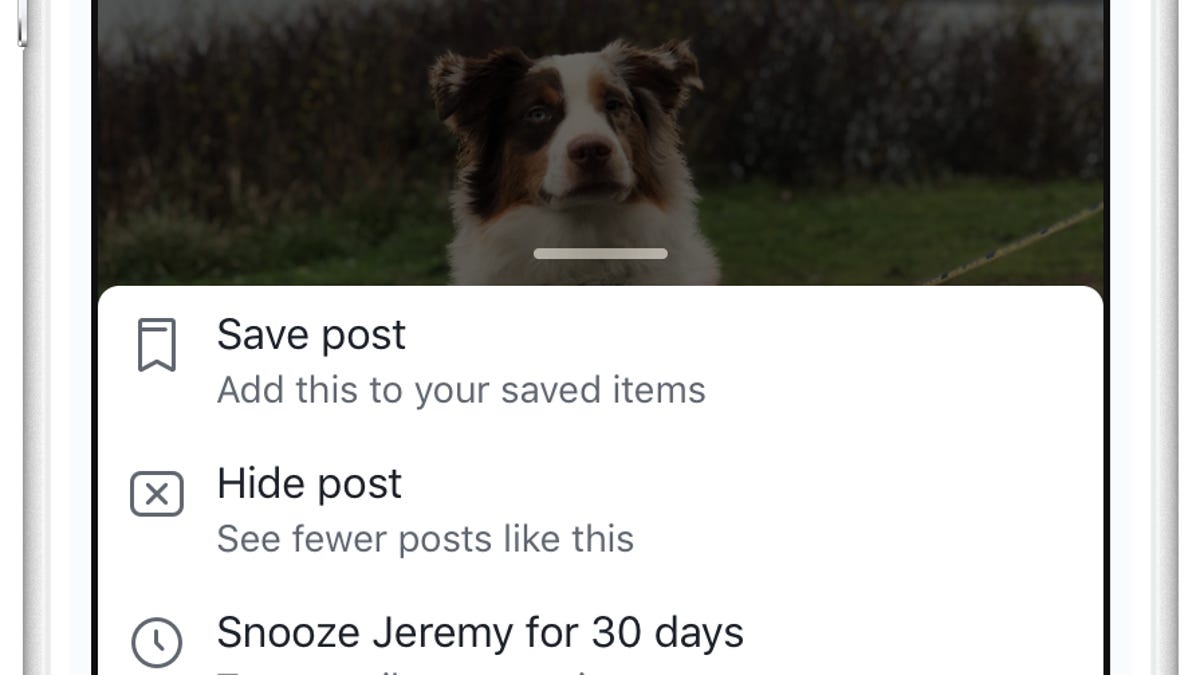Facebook's Snooze button lets you mute news feed distractions
The new feature, previously only in testing, arrives as Facebook faces criticism from former employees over social media's impact on our well-being.

You can temporarily mute friends, groups and brand pages on Facebook.
Sometimes there are people on your Facebook feed you just don't want to see for a while. The social network says it wants to help.
Facebook on Friday globally released a feature called Snooze that lets users hide certain people, groups or brand pages for up to 30 days, without permanently unfriending or unfollowing them. When the snooze window is about to end, you'll get an alert to let you know or renew the snooze. The tool was previously only in testing.
The idea is for people to have more control over their news feeds -- in case they are having tensions with a friend or partner, or if people want to avoid certain topics. But the feature is also good for Facebook, which benefits from its users having expansive networks on the site so they can target ads to users. Temporarily muting a connection is better for Facebook than someone permanently cutting it off.
The announcement comes as a parade of former Facebook employees have spoken out against the company and social media in general, and the impact it might have on the well-being of people. Sean Parker, Facebook's first president, said last month that social media is "exploiting a vulnerability in human psychology" and wondered what it was doing to the brains of children. Antonio Garcia-Martinez, a former Facebook product manager, said in May that the company is "lying through their teeth" about the power of their ad targeting tools.
Most recently, Chamath Palihapitiya, Facebook's former vice president of user growth, said last month that social media is "ripping apart the social fabric of how society works," though he later walked back his comments and clarified he was not talking specifically about Facebook.
The company is also still trying to come to grips with its power and influence in the world. Facebook has been blamed for misinformation and discord spread on its platforms by Russian trolls as they sought to meddle in last year's US election. Facebook, along with rivals Google and YouTube, were grilled by lawmakers about foreign interference last month during congressional hearings on Capitol Hill.
Despite the timing of the announcement, Facebook has been researching well-being and trying to improve the news feed for a long time, a source familiar with the company's thinking said.
Two years ago, the social network unveiled tools to give people more power over how much content they see from their exes on Facebook. The company also updated its suicide-prevention tools last month.
In terms of how Facebook is affecting the emotions of users, the company says there's both good and bad. Facebook cites studies from the University of Michigan, UC San Diego and Yale that says passively consuming content on the site without interacting with people could have a negative effect on your mood. On the flip side, more personal interaction on the social network -- like posting comments and sending messages -- can have positive effects, according to a Carnegie Mellon study.
"We don't have all the answers, but given the prominent role social media now plays in many people's lives, we want to help elevate the conversation," David Ginsberg, Facebook director of research, and Moira Burke, Facebook research scientist, wrote in a blog post. "In the years ahead we'll be doing more to dig into these questions, share our findings and improve our products."
Tech Culture: From film and television to social media and games, here's your place for the lighter side of tech.
'Alexa, be more human': Inside Amazon's effort to make its voice assistant smarter, chattier and more like you.

